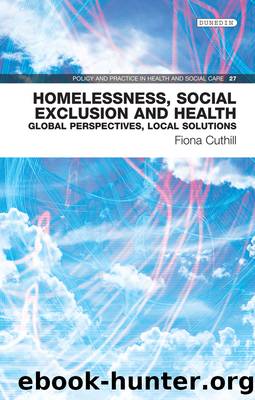Homelessness, Social Exclusion and Health by Cuthill Fiona;

Author:Cuthill, Fiona;
Language: eng
Format: epub
Publisher: Dunedin Academic Press
Published: 2019-08-15T00:00:00+00:00
The meaning of home: Mental health, ontological security and well-being
Scholars, practitioners and policymakers all realise that it is a long distance travelled between sleeping rough and having a home: a home is somewhere that is idealised, imbued with meaning and so much more than merely a roof over your head. To have a home acknowledges the importance of the physical, legal and social boundaries of home for health and well-being. The conceptualisation of home is much more than a structural shelter, and sociology scholars invite us to more fully understand the importance of home as an entity that is used to express identity, maintain mental health and ensure well-being.
Somerville (1992) was one of the first theorists to explore the multiple meanings of âhomeâ for those who are homeless. In contrasting ârooflessnessâ with âhomelessnessâ, he identified the elements of home as: âshelter, hearth, privacy, roots, abode and (possibly) paradiseâ (Somerville, 1992, p. 332). This builds on early optimistic and idealised notions of home as a place of privacy, identity, safety, family and belonging (Saunders and Williams, 1988). While it is widely recognised as a place of physical shelter, of social relationships and of idealised associations, it is also a place of contested identities and porous boundaries. Home is a place imbued with meaning (Mallett, 2004) and a place where identity is shaped and children are nurtured (Saunders and Williams, 1988). A wide range of scholars have identified the mental health benefits of home (Kidd and Evans, 2010; Ahmet, 2013; Alaazi et al., 2015), and safety, security, privacy and control are key components of this. Home is a place where it is possible to escape the pressures of a fluid world and to be private, secure and safely hidden against the pressures of the public world.
Sociologist Anthony Giddens first conceptualised this sense of âbeing in the worldâ (Giddens, 1991, p. 92) as ontological security and argues that ontological security is established in childhood and is an emotional need in all societies. Certainly, many scholars see the importance of ontological security for people who are experiencing mental illness (Laing, 1965; Padgett, 2007), for homeless women (Tomas and Dittmar, 1995), indigenous people (Alaazi et al., 2015) and those living in conflict zones (Sousa et al., 2014). It is clear that having a sense of home is important to emotional health and well-being, beyond merely having a roof over oneâs head. Dupuis and Thorns (1998) argue that:
much of the work that goes into maintaining or restoring a sense of ontological security takes place in the private realm, where tensions built up from the constant surveillance in other settings of daily life can be relieved (Dupuis and Thorns, 1998, p. 27).
The idea of ontological security has emerged as an important psychological concept, and this seems to be important for people who are experiencing homelessness, as well as for people who are housed. Nonetheless, for many people who are housed in B&Bs, hostels, temporary and overcrowded accommodation, there is little sense of ontological security and little relief from the tensions of daily life (Mackie et al.
Download
This site does not store any files on its server. We only index and link to content provided by other sites. Please contact the content providers to delete copyright contents if any and email us, we'll remove relevant links or contents immediately.
Good by S. Walden(2925)
The Social Psychology of Inequality by Unknown(2320)
0041152001443424520 .pdf by Unknown(2231)
The Checklist Manifesto by Atul Gawande(2211)
The Meaning of the Library by unknow(2079)
23:27 by H. L. Roberts(1896)
Guns, Germs and Steel by Diamond Jared(1894)
Being Mortal: Medicine and What Matters in the End by Atul Gawande(1812)
Borders by unknow(1792)
A Leg to Stand On by Oliver Sacks(1717)
The Hot Zone by Richard Preston(1643)
And the Band Played On by Randy Shilts(1625)
The Valachi Papers by Peter Maas(1521)
The Obesity Epidemic by Robyn Toomath(1429)
The Laws of Medicine by Siddhartha Mukherjee(1420)
The Andromeda Strain by Michael Crichton(1370)
The Plague and I by Betty Macdonald(1270)
Pharmacy Practice and The Law by Richard Abood(1259)
Autism's False Prophets by Paul A. Offit(1246)
